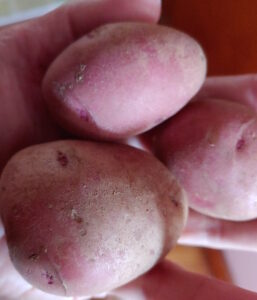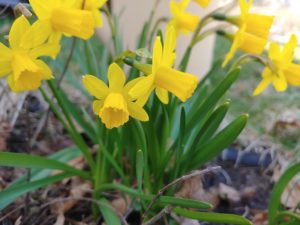What sizzles
in boiling
oil
is the world’s
pleasure:
French
fries
go
into the pan
like the morning swan’s
snowy
feathers
and emerge
half-golden from the olive’s
crackling amber.
Garlic
lends them
its earthy aroma,
its spice,
its pollen that braved the reefs.
Then,
dressed
anew
in ivory suits, they fill our plates
with repeated abundance,
and the delicious simplicity of the soil.
[Pablo Neruda (Ken Krabbenhoft, trans.); Odes To Common Things; New York: Bulfinch Press, 2010, p. 147]
Last year, the potato harvest at the library’s learning garden was measured in pounds – all started from a handful of green tinted, stubby-root covered potatoes that were hiding in the back of my potato box. A couple of months after planting and a couple of days after pulling them from the soil, five middle schoolers scrubbed them clean. Thin sliced, soaked in salt water, lowered into golden oil, the learners turned those potatoes into chips. With a little guidance, work, and patience, garden-to-table went from an abstract idea to a direct and tasty experience. Long after they’ve grown up, they will remember the work it took to grow, harvest, and cook one of their favorite snacks. With Neruda, they may look at their plate of potatoes and know:
Then, dressed anew in ivory suits, they fill our plates with repeated abundance, and the delicious simplicity of the soil.
Maybe, when they say grace, they will be thankful for all the hands that prepared their plate full of food. And maybe, just maybe, it will be their own hands that turn soil and seed into food.
[For the past several years, I’ve been the learning gardener at my local library, leading a summer program for the very young, the middle schooler, and their parents and grandparents with the Marcia, the children’s librarian. Last year, Katarina joined in, bringing her considerable gardening and cooking talents – along with her deep fryer and a potato chip recipe. Although the pandemic cancelled this year’s program, I have faith that it will return in the years to come, and continue well beyond my own leadership.]


